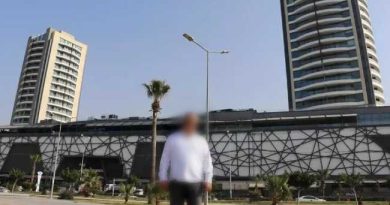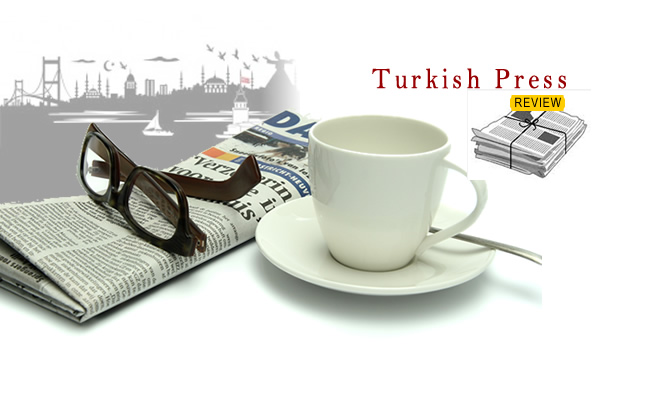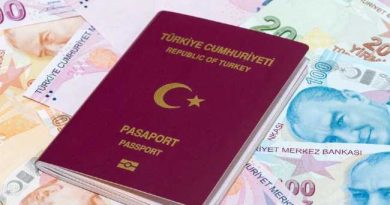News Scan, 19th Feb: EU letters put pressure on Ankara for disputed laws
EU letters put pressure on Ankara for disputed laws
At wit’s end with the Turkish government’s machinations in the judiciary, the EU sends a new letter to Ankara to demand the rule of law be upheld in the wake of the graft probe, although PM Erdoğan remains bellicose
The European Union has sent its fifth letter to Turkey since the emergence of a major graft probe to urge the Turkish government to proceed with caution over contentious bills on the Internet and the judiciary, the Hürriyet Daily News has learned.
At the same time, the bloc has also expressed its concerns that widespread corruption and graft claims are not being efficiently investigated because of a massive purge of police officers and prosecutors that followed the launch of the Dec. 17, 2013, case, according to sources.
The most recent letter, signed by Stefan Füle, the EU commissioner for enlargement, to EU Minister Mevlüt Çavuşoğlu arrived in Ankara last week after Parliament approved the controversial Internet Law. The EU Commission confirmed the recent correspondence from Brussels to Ankara, but declined to comment or give details as it does not want to convey its messages via the media.
HURRIYET DAILY NEWS
Turkish president ratifies controversial Internet bill
Turkey’s President Abdullah Gul signed a controversial Internet bill into law Tuesday, despite having asked for amendments to two key points. On his Twitter account, Gul said he was pleased with the government’s decision to modify the bill.
The bill allows the country’s national telecommunications authority (TIB) to block access to particular parts of websites without prior court approval, inducing opposition and media claims that the government wants to shut down the Internet.
Immediately after the bill’s ratification, Turkey’s ruling AK Party submitted an amendment package to the parliament to revise the points in question.
Communications Minister Lutfu Elvan met with delegations from the three main opposition parties in the Turkish parliament. Elvan said the government agreed to amend two widely criticized measures that allow the TIB to block access without court approval. The TIB will be able to deny access to web pages due to privacy violations, but it must receive a court order within 24 hours, he said. Elvan said a decision to store Internet users’ browsing histories would only be given by a court order. He said Internet traffic information would be collected by IP and subscriber numbers, instead of web addresses.
In 2013, almost half of Turkey’s population was Internet users. The estimated number of Twitter users is 12 million and more than 32 million people in the country use Facebook. The country’s total population is about 77 million.
AA
Swoboda says HSYK legislation an outright attack on rule of law
Brussels’ strong criticism of a new law in Turkey restructuring the Supreme Board of Judges and Prosecutors (HSYK) continues, with statements being made by various EU officials. Socialist Group leader and one of the most veteran politicians of the European Parliament Hannes Swoboda harshly reacted to the new law on the HSYK. Swoboda said the law was an outright attack on the independence of the judiciary and the rule of law.
Speaking to Today’s Zaman, Swoboda said the new law was deeply worrying for the European Union. Not bothering to mince his words, the Austrian politician said it was unthinkable in a democracy for the appointment of judges and prosecutors to not be protected from political interests. “It is inconceivable in a democracy that the appointment of judges and prosecutors is not distinguished from political interests and actors,” he said.
Stressing that the law would not be in line with EU legislation, he warned President Abdullah Gül on the possible repercussions that the law would have on EU-Turkey relations if he approves the legislation. “I do not see how this law could be compatible with EU legislation or how it will be constructive in furthering Turkey’s EU integration process if President Gül signs it into law,” he said.
Swoboda also pointed out that, as a socialist, he had supported the Sept. 12, 2010 referendum in Turkey which had restructured the HSYK despite the harsh criticism he received from his sister party, the Turkish opposition Republican People’s Party (CHP). “When the proposal seemed realistic and constructive, I supported the referendum of September 2010. But now this law has mutated into an outright attack on the independence of the judiciary and therefore the rule of law,” the Socialist leader said.
TODAYS ZAMAN
Turkish President Gül admits decline of media freedom
The media has the right to rise up against “wrongful practices,” President Abdullah Gül has said during a trip to Hungary, expressing his concerns over ever-diminishing press freedom in Turkey.
Gül likened the weakening global image of Turkey to the fading of a light which had, until very recently, been shining brightly.
“There should be no pressure on the press,” Gül said yesterday as he wrapped up his visit. “In this regard, complaints are increasing.”
His remarks came upon journalists’ questions on the restricted level of press freedom that has been harming EU hopeful Turkey’s image, a pressure which has become more visible after tape recordings showing the government’s pressure on the media emerged. The recordings emerged almost simultaneously with tape recordings showing the alleged involvement of the government in corruption and bribery.
As Gül argued that no media institution should be intimidated but should do what it believed to be the right thing, he was asked whether he had something to say for those figures that had interfered in the media’s choices of broadcasting.
“No such interference should happen,” Gül said. “Reporting is also a public duty. You are addressing millions of people and there is a responsibility there, too. When the situation requires it, the media should have self-control in line with various moral principles. And when the situation requires it, it should insist on doing what it believes is right to do. And if it sees something which is against what it believes is right, then it should rise against it,” the president said.
HURRIYET DAILY NEWS
Central Bank keeps rates on hold, confirms problems ahead
Turkey’s Central Bank kept interest rates on hold on Tuesday after hiking them sharply last month to help stabilize the lira amid inflationary pressure on markets and an anticipated economic slowdown in the first quarter of 2014, the bank acknowledged.
Following a monetary policy meeting in Ankara on Tuesday, the bank kept its overnight lending rate at 12 percent, its one-week repo rate at 10 percent and its overnight borrowing rate at eight percent as expected in the market.
The decision to keep rates unchanged comes amid fears that further tightening would hit growth ahead of elections next month. In its written statement, the bank said it “closely monitors recent deterioration in the inflation outlook. … There is a gradual slowdown in loan growth stemming from the tight monetary policy stance, the recent macro prudential measures and weak capital flows. The data regarding the first quarter of 2014 indicate some deceleration in private final domestic demand.”
The bank said it would maintain its tight stance until there is a significant improvement in the outlook for inflation, which it expects to remain above its five percent target for some time. “Having hiked interest rates in an extremely aggressive and somewhat panic-stricken manner last month, Turkey’s Central Bank is taking a much-needed breather and is hoping its much stronger anti-inflationary stance will be enough to establish credibility,” said Nicholas Spiro, head of London-based financial consultancy Spiro Sovereign Strategy. “While a lot hinges on market sentiment towards emerging markets, concerns are already shifting from the current account deficit to the bleaker prospects for growth. The politics of Turkish monetary policy are taking center stage,” he said.
TODAYS ZAMAN
Turkey defers to Baghdad on oil from Iraqi Kurdistan
With hundred of thousands of barrels of its oil stuck in the Turkish Mediterranean port of Ceyhan, unable to be sold on the world market because of its continuing row with Baghdad, the Kurdistan Regional Government (KRG) is discovering just how landlocked and boxed in it is in terms of utilizing the vast oil reserves under its control.
KRG Prime Minister Nechirvan Barzani shuttled between Istanbul and Baghdad again in the last few days in a fresh attempt at overcoming the problem, but with little apparent success. Baghdad appears determined to stick to its guns and prevent the KRG from selling oil from northern Iraq unilaterally, saying this violates Iraq’s Constitution.
Baghdad also has support from Washington, where administration officials fear the energy cooperation between Turkey and the KRG will increase the risk of splitting up Iraq — already in the throes of sectarian strife — and are consequently putting pressure on Ankara over its energy dealings with the Iraqi Kurds.
Iraq’s Constitution says oil revenues, regardless of where the reserves are located in the country, have to go through Baghdad and allocates the autonomous Kurdish region 17% of total revenues.
.al-monitor.com
Privatization revenue drop weakens Turkey’s budget surplus
The January budget surplus remained far below expectations at 1.9 billion Turkish Liras, as the decline in the contribution of privatization revenues declined sharply compared to the same period last year. The budget had logged a 5.9 billion lira surplus in the same month last year, lifting the primary surplus to 11.2 billion liras. According to budget balance figures announced by the Finance Ministry, the primary surplus was 6.9 billion lira this January.
In a statement released following the announcement of the data, Finance Minister Mehmet Şimşek pointed to the lower privatization income compared to last year. “Despite the budget surplus being lower than last January’s 5.9 billion liras surplus, this difference is caused by 4.2 billion-lira privatization income transferred to budget last year,” Şimşek said.
Surging by over 16 percent, the rise of central government spending has outstripped revenues, which rose only 2.8 percent through January. The ministry announced that January revenue amounted to 37.9 billion liras and the expenditure was 36 billion liras. Non-tax revenue dropped by 45.2 percent to 4.2 billion liras.
Even the Finance Ministry’s tightened financial auditing, which raised tax revenues by 15 percent and 32.7 billion liras, failed to cover the losses stirred by the decline in privatization revenue. In his statement, Şimşek praised the tax collection performance of the government, recalling that almost all tax items had recorded a surge.
HURRIYET DAILY NEWS
19.02.2014
This is a news-scan from major Turkish papers and internet sites. However, we do not verify above stories neither do we vouch for their accuracy.





